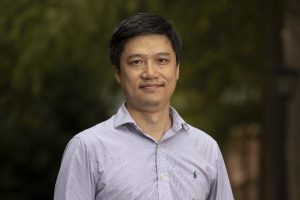University of North Carolina Lineberger Comprehensive Cancer Center researchers have discovered a gene whose over-expression is key to the development and progression of multiple myeloma, and a potential treatment strategy to block its downstream effects.

UNC Lineberger’s Greg Wang, PhD, associate professor in the UNC School of Medicine Department of Biochemistry and Biophysics, and colleagues reported in the journal Blood that the PHF19 gene is critically involved in development and progression of multiple myeloma, a disease where plasma cells grow out of control.
Researchers also demonstrated that an experimental therapeutic, UNC1999, showed early promise in laboratory models of multiple myeloma.
“We identified a crucial cancer promoting pathway in multiple myeloma, and we have promising evidence for a potential new way to treat this type of blood cancer,” Wang said.
Multiple myeloma is a cancer that develops in plasma cells, which are immune cells that generate antibodies against invading diseases. There are estimated to be 32,110 new cases of this cancer and 12,960 deaths in the United States this year, according to the National Cancer Institute.
Researchers in Wang’s lab discovered in a retrospective analysis of data from multiple clinical trials that high expression of the PHF19 gene was linked with correlated with poorer prognosis.
Using state-of-the-art gene-loss-of-function techniques, Wang and his team demonstrated the dependence of various multiple myeloma models on the PHF19 protein in progression of the disease.
They went on to describe how mutations of this gene lead to hyper-activation of another protein group called, Polycomb Repressive Complex 2 (PRC2), to help drive multiple myeloma. Overexpression of this gene leads to hyperactivation of PRC2, which leads to epigenetic changes that alter how DNA is structured, read and translated into proteins.
“PRC2 ‘silences’ a full battery of gene sets that are involved in proliferation inhibition, terminal differentiation and immune response, all of which are known to function to suppress tumor growth,” Wang said.
They also found a small molecule inhibitor that can block EZH2, an enzyme that is a component of the PRC2 protein group. This experimental inhibitor showed promise in early, laboratory models of multiple myeloma. Specifically, researchers reported that this inhibitor “significantly delayed” tumor progression in animal models of the disease.
The inhibitor was initially developed at UNC-Chapel Hill by a coauthor on the study Jian Jin, PhD, who is now the Mount Sinai Endowed Professor in Therapeutics Discovery, professor in the Departments of Pharmacological Sciences and Oncological Sciences, and the director of the Mount Sinai Center for Therapeutics Discovery at Icahn School of Medicine at Mount Sinai.
“Unlike those genetic mutations, epigenetic abnormalities of human tumors are sort of a software malfunction, instead of hardware breakage,” Wang said. “Epigenetic alterations are more amenable to therapeutic interventions.”
Wang said the researchers will continue to study the underlying mechanisms behind these proteins and this cancer type, and will also continue to develop even better inhibitors to suppress the action of PRC2 and PHF19.
In addition to Jin and Wang, other authors included Zhihong Ren of UNC-Chapel Hill; Jeong Hyun Ahn of UNC-Chapel Hill; Hequn Liu of Albert Einstein College of Medicine; Yi-Hsuan Tsai of UNC Lineberger; Natarajan V. Bhanu of the University of Pennsylvania; Brian Koss of the University of Arkansas; David F. Allison of the UNC School of Medicine Department of Biochemistry and Biophysics; Anqi Ma of the Mount Sinai School of Medicine; Aaron J. Storey of the University of Arkansas; Ping Wang of the Albert Einstein College of Medicine; Samuel G. Mackintosh of the University of Arkansas; Ricky D. Edmondson of the UAMS Myeloma Center; Richard W.J. Groen of VU University in the Netherlands; Anton C. Martens of UMC Utretcht in the Netherlands; Benjamin A. Garcia of the University of Pennsylvania; Alan J. Tackett of the University of Arkansas; Ling Cai of UNC-Chapel Hill; and Deyou Zheng of the Albert Einstein College of Medicine.
The study was supported by UNC Lineberger; a North Carolina Biotechnology Center Institutional Support grant; the National Institutes of Health; a Kimmel Scholar Award; When Everyone Survives; the Leukemia Research Foundation; and the Gabrielle’s Angel Foundation for Cancer Research. Individual researchers were supported by the U.S. Department of Defense Career Development Award and the American Society of Hematology, and the Leukemia & Lymphoma Society.
